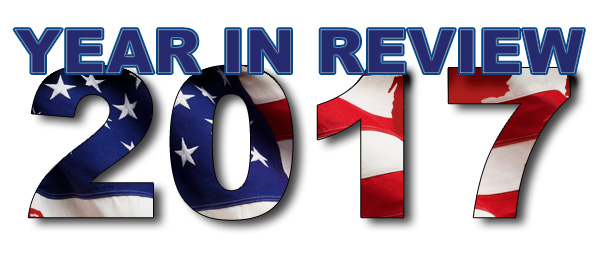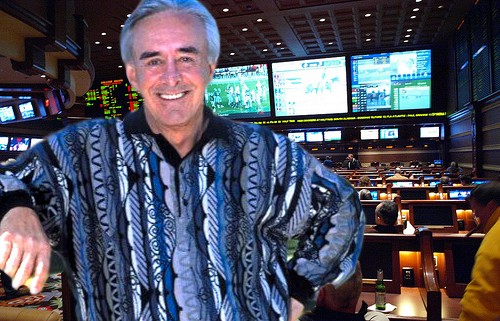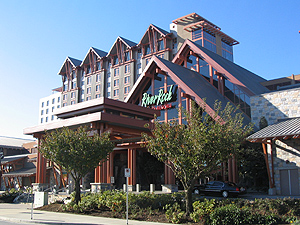
The top ten gambling stories of the year, Part 1
2017 saw the growth of Internet gambling continue and a huge push to legalize sports bettnig in America. The stories below are the top gaming stories of 2017 numbers six though 10. The #1 gambling news event will be revealed in part 2 of the top 10 North American gambling stories of 2017.
10. The sentencing of Billy Walters
 While this story likely will affect very few in the gambling industry it is notable just do to the iconic structure of the man. Billy Walters, as many know, is a famous gambler and businessman. Born in Kentucky Walters is the son of a professional poker player and the nephew of a professional gambler. Walters lost his first bet at 9 years old, but that convinced him to learn the nuances of sports betting and he became quite successful running an illegal bookmaking business out of a car dealership in Kentucky. He was arrested and paid a fine for the operation but was only given a misdemeanor charge. Not to be deterred, Walters moved to Las Vegas in the early 1980s where he could bet on sports legally. He became close friends with computer programmers and mathematicians and together they became known as The Computer Group and were taking bookies across the U.S. for millions of dollars each year. The success caught the eye of the feds and mobsters who don't like to lose. Eventually the Computer Group broke up, and Walters started up his own company using what he learned from the Computer Group and his own self taught knowledge to make winning wagers.
While this story likely will affect very few in the gambling industry it is notable just do to the iconic structure of the man. Billy Walters, as many know, is a famous gambler and businessman. Born in Kentucky Walters is the son of a professional poker player and the nephew of a professional gambler. Walters lost his first bet at 9 years old, but that convinced him to learn the nuances of sports betting and he became quite successful running an illegal bookmaking business out of a car dealership in Kentucky. He was arrested and paid a fine for the operation but was only given a misdemeanor charge. Not to be deterred, Walters moved to Las Vegas in the early 1980s where he could bet on sports legally. He became close friends with computer programmers and mathematicians and together they became known as The Computer Group and were taking bookies across the U.S. for millions of dollars each year. The success caught the eye of the feds and mobsters who don't like to lose. Eventually the Computer Group broke up, and Walters started up his own company using what he learned from the Computer Group and his own self taught knowledge to make winning wagers.
He became so successful at sports betting that sports books refused to take his bets. As a result, Walters started using beards to place his bets. Some of these beards apparently included noted celebrities, including Ashton Kucher, Floyd Mayweather and Bruce Willis. Walters was featured in a 60 Minutes interview a few years back and he indicated that all his bets are educated and legal. He claimed he used analytics, but also hired on people who were close to teams and were able to get information about injuries, weather forecasts and the like before it reached the public. Walters noted he never had a losing season from 1974 to 2013 and he averaged a profit of about $5 million a year. Walters also owned several golf courses, including two courses in Las Vegas – the Desert Pines and Royal Links, which Walters sold and claimed to have lost millions of dollars on and he still owns several car dealerships. Walters has also targeted by the FBI, IRS and the Nevada Gaming Commission because of his success and even had charges laid against him for money laundering, although they never stuck. He was also apparently targeted by the mob at one point in his life likely due to his time with the Computer Group. Despite his success there were always suspicions that he was cheating, and several people indicated how he used to have people place a lot of smaller bets on a team to move a line to something he wanted and once the line moved he would place a much larger bet on the other side, i.e. the team he truly wanted to bet on. Walters was tried 4 times on suspected cheating and money laundering, but each time the case was thrown out due to lack of proof.
Walters also was close friends to many celebrities including notable golfer Phil Mickelson who he wagered with on golf. Mickelson became part of an investigation into Billy Walters which eventually would lead to Walters' arrest and sentencing. According to the FBI, Billy Walters was involved in insider trading involving Fortune 500 firm Dean Foods. The reports claimed that Walters made $32 million from the insider trading over a 4-year period when he likely should have lost $11 million. After being threatened with arrest himself, Thomas Davis, a former Dean Foods Chairman testified against Walters in exchange for some form of immunity and Walters' defense argued that Walters didn't make any trading decisions regarding Dean Foods on his own but was rather mirroring trades of a friend of his Carl Icahn. Phil Mickelson was originally involved in the investigation himself, but prosecutors never sought prosecution against him and Mickelson avoided any further investigation by paying a one million dollar fine to the SEC from profits he made on Dean Foods (apparently on the advice of Walters) while admitting no wrongdoing.
In July 2017 Walters was found guilty and was given a 5-year sentence and ordered to pay a $10 million fine. In the sentencing the judge in the case called Walters "a cheater and a criminal, and not a very clever one."
Many in the industry believe Walters got very lucky because he could not have been so successful in gambling without doing something wrong and this sentencing was almost equivalent to how Al Capone was eventually taken down not on murder charges, but rather on tax evasion. But others close to Walters have claimed he is innocent and was targeted simply charged because of his success. In any case this outcome was a major blow to an icon in the gambling world.
9. The growth of horse racing in New Jersey thanks to exchange wagering
Horse racing has struggled for the last few decades. Revenue has dropped considerably and as a rule, those who bet on horse racing today are older and betting less. It's that very reason the horse racing industry has sought out new opportunities and in May 2016 Betfair decided to do just that, introducing exchange wagering on horse racing in partnership with Monmouth racetrack, and it has expanded to other race tracks.
Exchange wagering is different from regular pari-mutuel wagering because it's based on player vs player betting rather than on a price set by the tote system at the start of a race. The bets are placed by New Jersey residents on 4njbets.com (powered by TVG) and are only accessible to Americans living in the state (global bettors have the option of betting into the pools as well). In exchange wagering, bettors list the price they want on a horse and other bettors can back that bet at the price listed or they can "lay" a horse or bet against it. So, for example if a horse is 2 to 5 in the wagering on the tote a bettor may offer odds of 1 to 2 to back the horse or 7% higher odds than the tote. Another bettor has the options of taking those odds or they can bet the other side and lay the horse at the corresponding odds of 2 to 1. Thus, if the bettor believes one of the other horses will beat that horse, he can get 2 to 1 odds that the horse will lose. The same option exists for place and show wagering but not for exotics. Of course, to work there must be several bettors offering odds. And he odds taken are the ones that count. The final odds on the tote board are irrelevant.
Naturally this is different than traditional horse racing where one can only bet on a horse to win, place or show. Another difference in exchange wagering is the ability to bet on horse racing while the race is being run. In a race like the Breeders Cup Turf this could have proven to be quite a profitable opportunity, as Talismanic came from being buried on the rail to win the race as a major longshot. No doubt some bettors would have offered close to 30 to 1 or higher when it appeared Talismanic had no chance of beating Beach Patrol or Highland Reel entering the stretch drive. As is the case with normal horse racing bets there is no liability to Paddy Power-Betfair since it's all player vs. player and the company wins via. a 12% commission on winning bets which is lower than the normal 20% takeout. Many in the industry were concerned about cannibalization of track revenues and about race fixing since a bettor can wager against a horse, rather than on a horse. Betfair, said they have addressed that issue by looking for suspicious wagering and have proven that in almost 20 years of exchange wagering there have been very few cases.
Exchange wagering got off to a slow start in New Jersey, but has gained momentum. According to figures released on exchange wagering around June 2017, exchange wagering helped increase TVG revenues by over 16% from the prior year and most people betting on exchange wagering are younger, some say almost 20 years younger than traditional horse race bettors, and many are new to the sport. Moreover, the amount bet via exchange wagering is substantially higher than traditional betting on the sport. More importantly, the figures are almost identical to what happened to Betfair when it first started up in the UK. As a Betfair spokesman told me "exchange wagering is a learning process. People will take some time to understand it, but once they do there is no going back." New Jersey residents currently have the option of betting on exchange wagering from certain smaller tracks in New Jersey, Florida, Iowa, Louisiana, Oklahoma, New Mexico, Pennsylvania, Massachusetts, Washington and Ontario, Canada. Plus the bettors can bet on most tracks in the UK.
If successful, Betfair hopes to expand the product to some of those states listed as well as California. In the Golden State exchange wagering has already been approved, but an agreement must be made between Betfair and both the California legislature and the horse racing industry and that is proving to be difficult. Nonetheless the interest and growth in horse racing in New Jersey among younger bettors and those new to the sport of kings is encouraging to the future of horse racing stateside.
8. The recusal of Jeff Sessions from online gambling legislation and the hiring of Rod Rosenstein
 It was never any secret that Jeff Sessions was not in favor of gambling and those concerns by gambling proponents were verified in Sessions' confirmation hearings, when in response to a question by Lindsay Graham on whether he would consider revisiting the 2011 DoJ opinion that stated the Wire Act only applied to sports wagering, Sessions answered that he was shocked to find out that the U.S. had regulated online gambling and he was prepared to revisit the opinion. In April Sessions seemed true to his word and started the process to re-criminalize online gambling, although several states and pro-gambling lobby groups were getting their ducks lined up to stop him.
It was never any secret that Jeff Sessions was not in favor of gambling and those concerns by gambling proponents were verified in Sessions' confirmation hearings, when in response to a question by Lindsay Graham on whether he would consider revisiting the 2011 DoJ opinion that stated the Wire Act only applied to sports wagering, Sessions answered that he was shocked to find out that the U.S. had regulated online gambling and he was prepared to revisit the opinion. In April Sessions seemed true to his word and started the process to re-criminalize online gambling, although several states and pro-gambling lobby groups were getting their ducks lined up to stop him.
To the delight of pro gambling groups, Jeff Sessions recused himself from any gambling issues after he hired Charles Cooper, a RAWA lobbyist and lawyer, to defend him in charges relating to the Russia probe. But to the dismay of those same groups Rod Rosenstein was hired on to replace Sessions and Rosenstein has been extremely tough to gambling groups. In his 12-year tenure as Maryland's Attorney General Rosenstein led the charge against NETeller for processing online gambling transactions; he was instrumental in the Blue Monday indictments which led to the seizures of online gambling sites Betmaker.com, WSEX.com, DoylesRoom.com and 7 other prominent sites; and he was instrumental in the indictments against Bodog.com executives and the seizure of the Bodog.com domain.
Rosenstein, also acts quickly to defend his own self-interest, as was evident when he hired on Robert Mueller as special counsel to investigate the Russian collusion charges against Trump and others, after his reputation was called into question when the White House claimed Trump fired James Comey at the behest of Rosenstein. So if Rosenstein believes the online gambling issue is a personal issue he could act accordingly to protect his interests.
Rosenstein's personal feelings on the matter will be identified soon if and when he responds to a letter written just last month by Lindsay Graham and Dianne Feinstein asking Rosenstein to revisit the 2011 DoJ ruling. In the letter, Graham and Feinstein suggest that Internet gambling "preys on children and society's most vulnerable" and also suggested that the decision must be changed because the FBI doesn't have the resources to effectively oversee online gambling to ensure money laundering doesn't take place and also to protect the interests of states that don't offer online gambling. Thus far Rosenstein hasn't replied in public, but if and how he does respond will be telling. One positive for gamblers is that Donald Trump has indicated support for online gambling and Trump clearly has no issue with firing anyone who he believes is going against his own beliefs.
It's unsure whether Sessions' recusal is good or bad, but with Sessions gamblers knew for certain he was working against them.
7. The changing fortunes of Atlantic City casinos
The news from Atlantic City the last few years has been bleak to say the least, but in 2017 there has been a renewal. At the beginning of 2017 Atlantic City announced its first revenue increase in almost a decade thanks mostly to online gambling profits in 2016 and the news was even better in the remainder of 2017. Almost $2.8 billion was won from gamblers in 2016 and almost 10% of that was from online gambling. That number is expected to rise substantially this year.
 While online poker continues to do very poorly in the state, with a 19% drop from 2016, online casino wagering has exploded. According to reports by the New Jersey Division of Gaming Enforcement, Golden Nugget/Betfair leads the way with over $52 million in online revenue for the 11-month period of January to November 2017; Borgata/Party is next with revenues of about $37 million; Tropicana/Virgin follows with revenues of about $36 million; Caesars/Harrahs/888 is fourth with revenues of about $32 million; and right behind is Resorts AC with revenues of almost $31 million. Projected to the end of the year, almost $165 million in revenue will be generated by online casinos. Almost $34 million was paid to the government in taxes in 2017 from all sources and around $123 million has been paid in taxes since its launch in 2013.
While online poker continues to do very poorly in the state, with a 19% drop from 2016, online casino wagering has exploded. According to reports by the New Jersey Division of Gaming Enforcement, Golden Nugget/Betfair leads the way with over $52 million in online revenue for the 11-month period of January to November 2017; Borgata/Party is next with revenues of about $37 million; Tropicana/Virgin follows with revenues of about $36 million; Caesars/Harrahs/888 is fourth with revenues of about $32 million; and right behind is Resorts AC with revenues of almost $31 million. Projected to the end of the year, almost $165 million in revenue will be generated by online casinos. Almost $34 million was paid to the government in taxes in 2017 from all sources and around $123 million has been paid in taxes since its launch in 2013.
As a result of the explosion in online gambling interest, several companies have started looking for a way to benefit with an Atlantic City presence (a requirement to operate online in the state). In fact, some casinos which were set to close have now received new suitors. The Hard Rock has reached an agreement to purchase the Trump Taj Mahal, The Revel is set to get a new buyer and even the on again off again fortunes of the Atlantic Club casino has apparently garnered new interest. And many global companies that want in on the game but don't want to own their own casino apparently have reached out to the other casino operators in the state to see if they can somehow get a piece of the action similar to the way Betfair, 888, PokerStars and Party Gaming have.
Even major concerns have been dispelled. One major concern that Atlantic City had was cannibalization by Pennsylvania casinos after they were introduced a few years back, since a large percentage of Atlantic City customers come from the Philadelphia and surrounding areas. And while a lot of customers stopped coming to Atlantic City after Parx, Harrah's Chester, Sugar House and other casinos first opened, it appears those losses have now stabilized. And even if Pennsylvania offers online gambling starting next year as expected, residents could never play online in New Jersey anyway.
The news is encouraging to both the state of New Jersey and to all potential casinos in the North East.
6. The choice of Great Canadian Gaming for the Toronto Casino bid despite a money laundering investigation
When the Ontario government announced its gambling revitalization plan which included a large resort Toronto casino, major casino operators fell over themselves to get a bid in to build and operate the new casino. After all, the Greater Toronto Area with over 5 million people is the fourth largest city in North America behind only New York, Mexico City and Los Angeles. MGM reportedly spent nearly $10 million on its bid and Caesars, the Las Vegas Sands and a few Canadian companies poured money into their bids as well. In the end Toronto city council voted against any casino, including one at Woodbine racetrack which already operated slot machines. The casino companies walked away angry and feeling duped, so when the new city council changed its mind and agreed to a casino at Woodbine, not surprisingly there was not a lot of enthusiasm. A few casinos including Genting and Penn National bid on the opportunity, which included the rights to a casino at Woodbine, as well as in the eastern suburb of Durham Region, but in the end the winner was Great Canadian Gaming which operates casinos in British Columbia, Ontario, Nova Scotia, New Brunswick, Iowa and Washington State. The announcement of the winner itself didn't evoke a great deal of buzz, but revelations about Great Canadian's conduct at a Richmond British Columbia casino afterwards did.
 Reports released by the Vancouver Sun just prior to the announcement indicated that the Royal Canadian Mounted Police investigated the River Rock casino (owned by Great Canadian) and determined that Asian "whales" were depositing hundreds of thousands of dollars at the casino and wagering up to a million dollars each weekend. The bettors were almost always Chinese nationals without fixed Canadian addresses. The customers came in with large hockey bags full of money in $20 denominations and would hand them to the cashiers. In turn they were given chips to play with. After they finished gambling the Asian players would cash out whatever chips they had and the cashiers would give them bundles in larger denominations. As such, the RCMP declared it was a clear case of money laundering and could be traced back to Paul King Jin, a Vancouver Spa owner. According to the report Jin concocted an elaborate scheme where he would help launder drug money using VIP gamblers (most who were Macau natives) as well as a money transfer business called Silver International Investment. The RCMP investigation concluded that Silver International Investment was effectively a bank for both Jin and drug traffickers and the operation was also involved in loansharking along with money laundering. Traffickers would bring their ill-gotten funds to International who gave the money to the gamblers in $20 denominations to wager with and the new "cleaned" funds they withdrew in larger denominations was sent back t a Chinese bank who would deposit the funds in the trafficker's account. In return Silver International took a 5% fee.
Reports released by the Vancouver Sun just prior to the announcement indicated that the Royal Canadian Mounted Police investigated the River Rock casino (owned by Great Canadian) and determined that Asian "whales" were depositing hundreds of thousands of dollars at the casino and wagering up to a million dollars each weekend. The bettors were almost always Chinese nationals without fixed Canadian addresses. The customers came in with large hockey bags full of money in $20 denominations and would hand them to the cashiers. In turn they were given chips to play with. After they finished gambling the Asian players would cash out whatever chips they had and the cashiers would give them bundles in larger denominations. As such, the RCMP declared it was a clear case of money laundering and could be traced back to Paul King Jin, a Vancouver Spa owner. According to the report Jin concocted an elaborate scheme where he would help launder drug money using VIP gamblers (most who were Macau natives) as well as a money transfer business called Silver International Investment. The RCMP investigation concluded that Silver International Investment was effectively a bank for both Jin and drug traffickers and the operation was also involved in loansharking along with money laundering. Traffickers would bring their ill-gotten funds to International who gave the money to the gamblers in $20 denominations to wager with and the new "cleaned" funds they withdrew in larger denominations was sent back t a Chinese bank who would deposit the funds in the trafficker's account. In return Silver International took a 5% fee.
While Great Canadian and River Rock claimed they never did anything wrong, did their due diligence and followed the rules laid out, it nonetheless raised the issue of what responsibility casinos must make to ensure everything is on the up and up. Great Canadian is not alone in shirking off any reports of money laundering and opposition parties in the Ontario government have called on the ruling Liberal Party to revoke the bid from Great Canadian as common sense would have told them that what was happening at River Rock wasn't kosher. It appears, however, this won't happen since Great Canadian is well under way to taking over operations at Woodbine, Ajax Downs and Great Blue Heron casinos, but the whole scandal is making waves around the whole casino industry in North America to see if existing anti money-laundering rules need to be amended.
Check out the top 5 gambling stories in North America for 2017, including daily fantasy sports, online gambling, sports betting and the Top Gambling story of 2017.
Read insights from Hartley Henderson every week here at OSGA and check out Hartley's RUMOR MILL!






































